Torta zuccherata delle sorelle Simili
Ci siamo! Oggi è il World Bread Day, la Giornata Mondiale del Pane.
E come ogni anno, mi unisco all'invito di Zorra a sfornare qualcosa di fragrante e confortante per tutti noi.
Quest'anno ho voluto dedicare questa lodevole giornata alle mie Maestre, anzi, le nostre Maestre perchè sono state amate, rispettate, condivise da migliaia se non milioni di persone nel mondo: le sorelle Simili. Esempio di grande umiltà e generosità, hanno saputo coinvolgere coi loro insegnamenti e la loro infinita pazienza anche chi pensava non sarebbe mai riuscita a sfornare qualcosa di buono. Personalmente sarò loro sempre molto grata e ogni volta che impasto il mio pensiero e la mia riconoscenza va sempre là, in quel di Bologna dove ho lasciato il mio cuore.
Ho scelto questa Torta Zuccherata che forse è una delle poche loro ricette mai provate e mi ha letteralmente stregato: un pan brioche morbidissimo, facile anche da fare (con un'impastatrice davvero davvero), reso più goloso dalla glassa zuccherosa, perfetto in ogni momento della giornata (qua è stato addentato ancora tiepido ed è durato dall'oggi al domani :-)).
Ho voluto trascrivere la ricetta paro paro come l'hanno scritta loro nel libro "Pane e roba dolce", a pag. 73 nell'edizione con la copertina arancione, credo del 2007, per rendere omaggio anche al loro modo garbato di scrivere e spiegare come procedere nella ricetta, dispensando consigli ogni qualvolta ce ne fosse stato bisogno. Inconfondibili anche in questo ;-)
Un grazie di cuore, care Margherita e Valeria, per le vostre insuperabili bontà che ogni volta ci confortano e abbracciano nel vostro amorevole ricordo!
E' una focaccia da servire per merenda o prima colazione. Pasta lievitata veloce, non eccessivamente condita e con un formato divertente da fare e facile da servire. Se disponete le palline, da cui è costituita, in piccoli stampini di stagnola da crème caramel a porzione e le farcite con crema pasticciera o marmellata, avrete una foccaccetta individuale veramente deliziosa.
Lievitino:
150 g di farina di forza
20 g di lievito di birra
80 g di latte
Impastare velocemente in una ciotola e lievitare fino al raddoppio (circa 1 ora).
Lievitino:
150 g di farina di forza
20 g di lievito di birra
80 g di latte
Impastare velocemente in una ciotola e lievitare fino al raddoppio (circa 1 ora).
Impasto:
450 g di farina
200 g di acqua, circa
3 tuorli
2 cucchiai di zucchero
1 cucchiaino di sale
1 limone, la scorza
100 g di burro a temperatura ambiente (per l'impasto)
50 g di burro fuso (per ungere le palline)
In una ciotola sciogliere il lievitino con l'acqua, aggiungere i tuorli (attenzione poichè, se mettete i tuorli direttamente nella farina, questi si ammassano direttamente e non riuscirete più a scioglierli, avrete così una focaccia a pois) poi tutti gli altri ingredienti, tenendo per ultimo il burro.
Battere energicamente per 8-10 minuti finchè l'impasto si staccherà dalle pareti della ciotola, metterlo sul tavolo, batterlo sollevandolo con le due mani e scagliandolo sul tavolo. L'impasto risulterà tenero, cio nonostante è necessario cercare di non unire troppa farina. Rimetterlo in una ciotola unta di burro e lasciare lievitare 1 ora circa. Rovesciare sul tavolo, lavorare brevemente e molto velocemente, poi formare 16 palline. Tuffare le palline nel burro fuso e disporle in una teglia rotonda di cm 26 circa, coprire a campana e far lievitare 25-30 minuti. Cuocere nel forno a 200° per 30 minuti. Sfornare e, appena tiepida, pennellare con la glassa.
Per ottenere foccaccette monoporzione procedere come segue: passare una pallina nel burro, toglierne un pezzetto e mettere il resto nello stampino, fare un buco al centro facendo salire la pasta sulle pareti fino a rivestire lo stampo, riempire il buco con la crema e coprire il tutto con il pezzetto di pasta tenuto da parte appiattendolo con le dita e fissandolo ai bordi pizzicandolo.
Glassa:
150 di zucchero a velo
3-4 cucchiai di chiara d'uovo
1 cucchiaio di Rum
Stemperare lo zucchero in una tazza con la chiara e il Rum battendo, deve risultare colante. Se quando la mettete sulla torta la vedete scorrere troppo velocemente unire ancora un poco di zucchero, se al contrario scivola via troppo lentamente unire un poco di Rum.
Considerazioni:
- ho lavorato col Ken e l'impasto si è incordato bene, nessun bisogno di aggiungere farina. Poi ho comunque battuto l'impasto a mano per 6/7 volte, come mi hanno insegnato le sorelle;
- sono riuscita a fare 17 palline di circa 63 g cadauna, così una l'ho messa nello stampino individuale (ma senza crema o marmellata);
- ho preparato la glassa con meno zucchero, circa 125 g, e aromatizzata con un liquore di arancia, deliziosa. Si potrebbe tranquillamente diminuire la dose di zucchero a 100 g e usare qualche cucchiaio di acqua o latte se non si vuole utilizzare l'albume crudo;
- ho preparato la glassa con meno zucchero, circa 125 g, e aromatizzata con un liquore di arancia, deliziosa. Si potrebbe tranquillamente diminuire la dose di zucchero a 100 g e usare qualche cucchiaio di acqua o latte se non si vuole utilizzare l'albume crudo;
- si mantiene soffice coperta a campana o in un sacchetto di nylon per alimenti per uno o due giorni (ma qua il giorno dopo era già finita); volendo si può intiepidire nel microonde per qualche secondo e risulta come appena sfornata.
Sugared Cake
(recipe by Simili sisters)
This is a Brioche, a sweet and soft focaccia to serve at teatime or breakfast. Pretty quick to make and in a funny shape. If you arrange the dough balls, stuffed with custard or jam, in individual small crème caramel foil molds, you will have a truly delicious individual foccaccetta (literally small focaccia).
For the starter:
150 g strong flour
20 g fresh yeast
80 g milk
Knead quickly all ingredients in a bowl and rise until doubled (about 1 hour).
For the dough:
450 g all-pupose flour
200 g water
3 yolks
2 tbs of sugar
1 teaspoon salt
1 lemon zest, grated
100 g butter at room temperature (for the dough)
50 g melted butter (to grease the balls)
For the starter:
150 g strong flour
20 g fresh yeast
80 g milk
Knead quickly all ingredients in a bowl and rise until doubled (about 1 hour).
For the dough:
450 g all-pupose flour
200 g water
3 yolks
2 tbs of sugar
1 teaspoon salt
1 lemon zest, grated
100 g butter at room temperature (for the dough)
50 g melted butter (to grease the balls)
just out the oven
In a bowl, dissolve the starter with the water, add the yolks one at a time then all the other ingredients, keeping the butter last.
Beat vigorously for 8-10 minutes until the dough comes off the sides of the bowl, put it on the working surface, beat it by lifting it with both hands and throwing at once on the table. The dough will be tender, however it is necessary to try not to combine too much flour. Put it back in a bowl (greased with butter) and let it rise for about 1 hour. Turn over on the working surface, work briefly and very quickly, then shape into 16 balls. Dip the balls into the melted butter and place them in a round pan of about 26 cm diameter, cover with another high pot and let rise for 25-30 minutes. Bake in the oven at 200° for 30 minutes. Remove from the oven and, just warm, brush with the icing.
To obtain single-portion foccaccette proceed as follows: dip a ball in the butter, remove a small piece and put the rest in the individual mold, make a hole in the center making the dough rise on the sides of the mold, fill the hole with the cream or jam and cover with the piece of dough kept aside by flattening it with your fingers and pinching it to the edges.
Icing:
150 powdered sugar
3-4 tablespoons egg white
1 tbs Rum
Dissolve the sugar in a small bowl with the egg white and the Rum mixing well with a fork or spoon, it must be dripping. If it runs too quickly when poured on the cake add a little more sugar, if too slowly add a little Rum.
Considerations:
- I worked with my stand mixer and the dough came out very well, no need to add flour. Then I still beat the dough by hand 6/7 times, as the sisters taught me;
- I managed to make 17 balls of about 63 g each, so I put one in the individual mold (but without cream or jam);
- I made the icing with less sugar, about 125 g, and flavored with an orange liqueur, delicious. You could easily reduce the sugar dose to 100 g and use a few tablespoons of water or milk if you don't want to use raw egg white;
- it remains soft if stored in a nylon food bag for one or two days (but here the next day was already all gone :-); if you want, you can warm it in the microwave for a few seconds and it looks like freshly baked.
Beat vigorously for 8-10 minutes until the dough comes off the sides of the bowl, put it on the working surface, beat it by lifting it with both hands and throwing at once on the table. The dough will be tender, however it is necessary to try not to combine too much flour. Put it back in a bowl (greased with butter) and let it rise for about 1 hour. Turn over on the working surface, work briefly and very quickly, then shape into 16 balls. Dip the balls into the melted butter and place them in a round pan of about 26 cm diameter, cover with another high pot and let rise for 25-30 minutes. Bake in the oven at 200° for 30 minutes. Remove from the oven and, just warm, brush with the icing.
To obtain single-portion foccaccette proceed as follows: dip a ball in the butter, remove a small piece and put the rest in the individual mold, make a hole in the center making the dough rise on the sides of the mold, fill the hole with the cream or jam and cover with the piece of dough kept aside by flattening it with your fingers and pinching it to the edges.
Icing:
150 powdered sugar
3-4 tablespoons egg white
1 tbs Rum
Dissolve the sugar in a small bowl with the egg white and the Rum mixing well with a fork or spoon, it must be dripping. If it runs too quickly when poured on the cake add a little more sugar, if too slowly add a little Rum.
Considerations:
- I worked with my stand mixer and the dough came out very well, no need to add flour. Then I still beat the dough by hand 6/7 times, as the sisters taught me;
- I managed to make 17 balls of about 63 g each, so I put one in the individual mold (but without cream or jam);
- I made the icing with less sugar, about 125 g, and flavored with an orange liqueur, delicious. You could easily reduce the sugar dose to 100 g and use a few tablespoons of water or milk if you don't want to use raw egg white;
- it remains soft if stored in a nylon food bag for one or two days (but here the next day was already all gone :-); if you want, you can warm it in the microwave for a few seconds and it looks like freshly baked.
Qui il form da compilare per partecipare
#wbd2022 #worldbreadday #worldbreadday2022

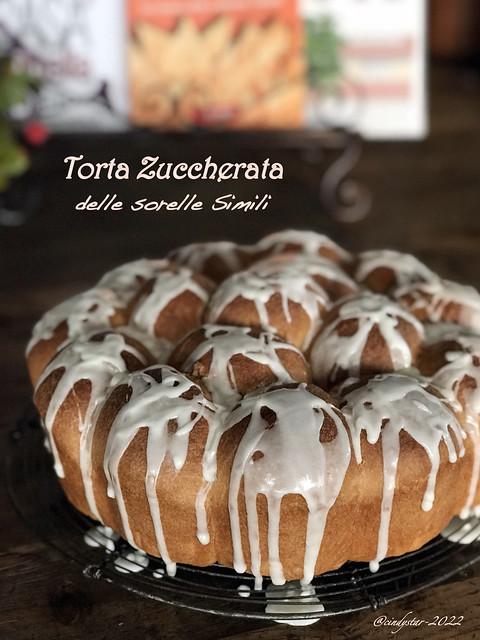
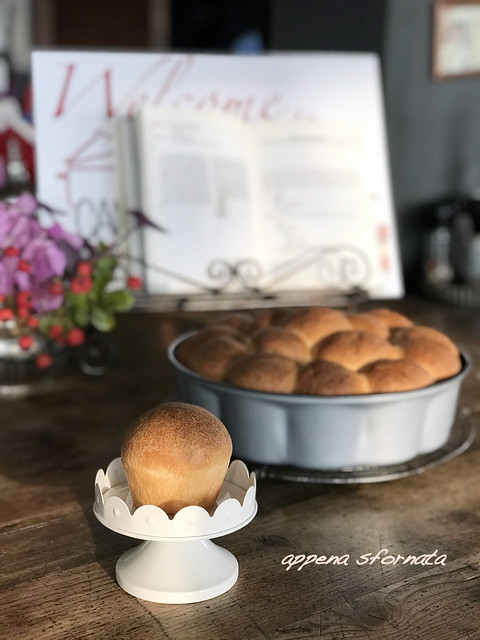
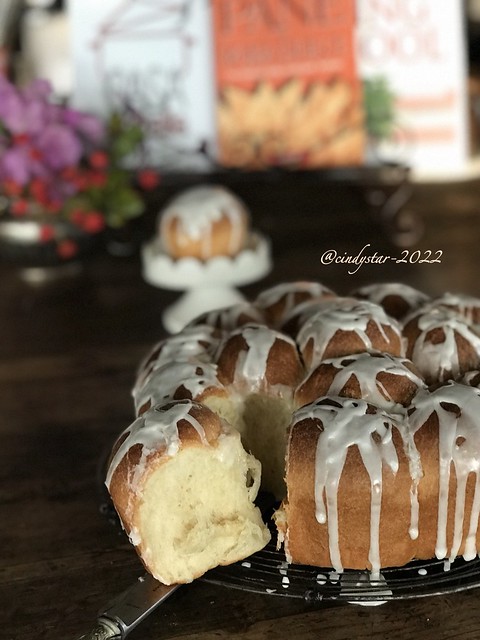

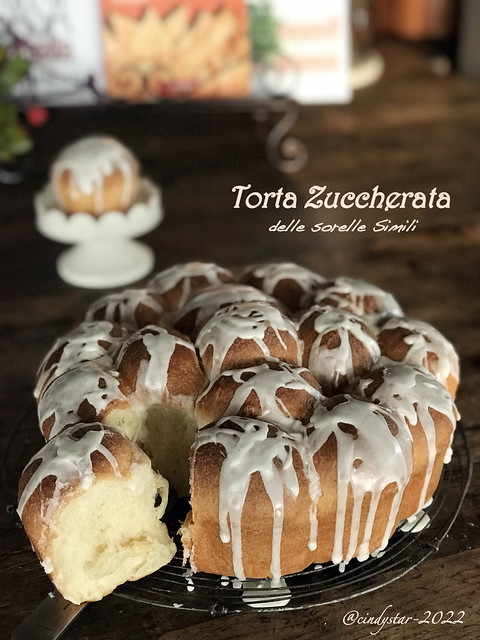
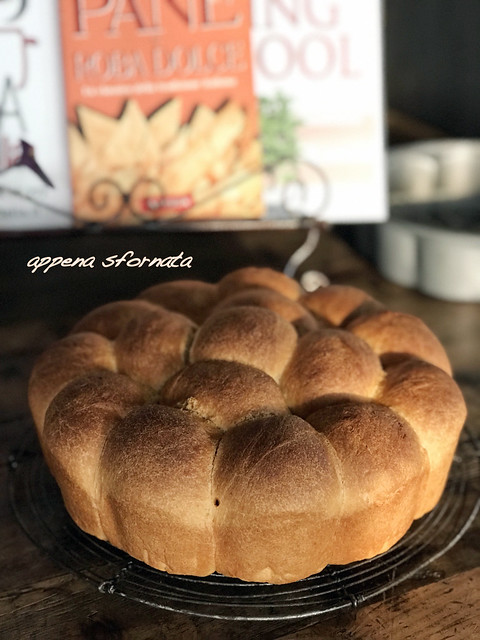
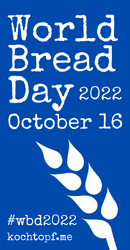












Nessun commento:
Posta un commento
grazie della visita e gentilmente firma sempre i tuoi commenti!
thanks for passing by and please sign up your comments!